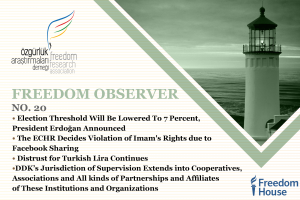From Editor-in-Chief
Two months ago, Devlet Bahçeli’s call during the DEM Party group meeting in the Turkish Grand National Assembly (TBMM) for Abdullah Öcalan to announce that the PKK had laid down its arms set a new political agenda. Last week, Bahçeli’s revision of this call seems to have steered Turkish politics onto a new path.
At the group meeting on November 26, Bahçeli updated his stance by dropping the condition for Öcalan to appear before Parliament, stating that discussions with the DEM Party would suffice. He reiterated his call with the statement, “We stand firmly behind what we’ve said. We expect face-to-face contact between İmralı and the DEM Group to be initiated without delay, and we resolutely repeat our call.”
Following Bahçeli’s updated call, members of the DEM Party applied to the Ministry of Justice to meet with Öcalan in prison. At the time of writing, the Ministry had not yet responded to this request. Meanwhile, President Recep Tayyip Erdoğan, who had not taken a clear stance on Bahçeli’s initial call for weeks, expressed support for this latest proposal. On the same day, during his party’s group meeting, Erdoğan said, “We are acting in harmony and coordination with Mr. Bahçeli. The People’s Alliance continues its path of unity. Mr. Bahçeli has truly put forward a bold and groundbreaking proposal. We are determined to eliminate the terror scourge using all available means.”
Although Erdoğan stated in his speech that they were addressing “this issue comprehensively, including its political, social, and regional consequences,” his subsequent remarks suggest that the current “initiative” on the agenda is limited to the expectation of ending terrorism through the elimination of the PKK. Indeed, the president continued his speech as follows:
“After Mr. Bahçeli’s historic call, the initial statements from Kandil and DEM indicate that both structures share the same mindset. / The picture before us does not allow for much optimism. … Our fight against terrorism will continue until the last terrorist is eliminated. We will not allow a terrorist structure to be established on our borders. We will turn the ideal of a Turkey without terrorism into reality.”
As noted in our previous issue, this latest statement aligns with Erdoğan’s earlier rhetoric: “Rather than a genuine intention to democratically resolve the Kurdish issue, there appears to be a strategic calculation guided by the security concerns of the State and the People’s Alliance regarding this matter.” In short, there is no “process” aimed at resolving the Kurdish issue through peaceful and democratic means. If there were, the government would not persistently and insistently continue its trustee policy targeting DEM Party mayors.
For instance, on November 23, the mayors of Tunceli (held by the DEM Party) and Ovacık (held by the CHP) were dismissed and replaced with trustees. Similarly, on November 28, the DEM Party mayor of Bahçesaray (Van) was removed and replaced by a trustee.
Meanwhile, as AKP Chair and President Erdoğan continue to leverage state resources to target his main rival, the CHP, and its members, the CHP appears to have adopted a tougher opposition stance against the government. As is well-known, CHP Chair Özgür Özel has been receiving internal criticism for pursuing a normalization policy against political power. The shift to a more confrontational policy might partly aim to deflect these criticisms. However, it seems there are other underlying reasons for this change.
Three key political developments are likely driving Özel’s tougher stance against the People’s Alliance: the government extending its trustee policy to the main opposition party, as seen in the Esenyurt and Ovacık cases; the Ministry of Defense initiated a disciplinary investigation into certain lieutenants who led an alternative oath-taking demonstration at a graduation ceremony, which could potentially result in their dismissal from the military; and finally, the launch of a criminal investigation against Özgür Özel by the Istanbul Chief Public Prosecutor’s Office over his remarks about Chief Prosecutor Akın Gürlek.
The Republican People’s Party (CHP), meanwhile, has elevated its stance against the government’s trustee practices to a new phase, emphasizing democratic sensitivities. On November 30, Özgür Özel held a meeting at the party headquarters with all CHP mayors to discuss the government’s trustee policy and its attempt to monopolize childcare facilities. At the end of the meeting, a statement was issued condemning the trustee policy as “a political coup attempt targeting the national will.”
On the other hand, it is difficult to say that the CHP has adopted a particularly principled stance on developments related to the Kurdish issue. While CHP leaders criticize the government for denying the existence of the Kurdish issue and viewing it merely as a tool for political gain, they do not appear to have a substantive policy addressing the essence of the matter. The CHP seems to give the impression of being unclear on this issue, leaving it uncertain whether they have any project aimed at a peaceful and democratic resolution.
In fact, this lack of clarity is not limited to this issue alone. Turkey’s fundamental problem is not only the absence of coherent, human rights- and democracy-oriented plans and projects to address the country’s issues among those in power but also among the main opposition party, which aspires to govern. Furthermore, neither seems to have the will to implement such solutions effectively.
In this issue, Ali Rıza Çoban highlights the importance of “immediacy or directness in proceedings” in relation to the principle of fair trial, citing a recent decision by the Constitutional Court. Ömer Faruk Şen evaluates the debate between the CHP and the government over the ministries’ attempts to shut down nurseries affiliated with municipalities. Meanwhile, Caner Gerek examines whether the downward trend in inflation is sustainable and whether it is realistic to expect an interest rate cut in December.
Looking forward to seeing you in the next issue of Freedom Observer.
* Prof. Dr. Mustafa Erdoğan
Decision on “Immediacy in Proceedings”
The Constitutional Court’s General Assembly has issued a significant ruling regarding the issues of fair trial rights arising from the frequent reassignment of judges and alterations to their jurisdictions in Turkey. As is well-known, one of the fundamental elements of the right to a fair trial is the principle of immediacy or directness in proceedings.
Particularly in criminal trials, uncovering the material truth requires that the evidence under scrutiny be directly examined by the court rendering the decision. In this context, the principle of immediacy entails the judge having direct contact with the evidence presented to clarify the facts without relying on intermediaries to gain information about the evidence.
The statements of witnesses, defendants, victims, and complainants play a critical role in uncovering the material truth. Observations made by the court about the demeanor and credibility of these individuals during their testimonies are crucial for understanding the facts of the case.
For this reason, it is vital that the judges who will render the decision participate in all stages of the trial, directly confront the evidence, and personally hear the witnesses, defendants, and victims uncover the truth and deliver a fair verdict. However, in Turkey, due to both the structure of criminal proceedings and the judicial system, decisions are often made by judges who have not directly encountered the evidence. First, during criminal investigations, evidence is not fully collected before the case is filed, and as a result, evidence collection continues during the trial. Additionally, although all evidence should typically be evaluated, and a decision should be rendered in a single hearing, poor preparation for hearings often leads to trials extending over multiple sessions, held several months apart. Yet, the Criminal Procedure Code establishes the principle that trials should be completed in a single hearing and within one day.
When trials are prolonged, the judges and prosecutors attending these sessions frequently change. The primary reason for this is the lack of geographical security for judges in Turkey, leading to their frequent reassignment to different judicial jurisdictions. Furthermore, continuous changes in the powers of judges and prosecutors result in their courts of assignment being constantly altered.
When these factors come together, in criminal cases lasting several years and conducted over eight to ten sessions, the judges who directly engage with the evidence and hear the witnesses are often different from those who render the final decision. Judges delivering the verdict often base their decisions solely on the records of previous hearings without personally hearing the witnesses or observing their demeanor.
Another issue related to these records must also be noted. During the trial, witness statements are not transcribed verbatim but are typically summarized by the presiding judge and recorded in this condensed form. This practice raises serious concerns about the fairness of decisions, especially in cases where witness testimony serves as the decisive evidence.
In the case reviewed by the Constitutional Court, the proceedings for the usury charges were conducted over ten sessions, during which the composition of the judicial panel changed. The presiding judge who led the first eight sessions was replaced, and a new presiding judge took over for the last two sessions. The final decision was rendered by the panel under the new presiding judge.
Moreover, seven different associate judges participated in the hearings across these ten sessions. Among the panel members rendering the decision, one judge had attended nine sessions, while another had only attended the final three. The witnesses whose statements formed the basis of the decision were heard in sessions where the presiding judge and one of the panel members rendering the decision were absent.
The court panel, which did not attend the sessions where the witnesses providing key testimony for the conviction were heard, justified the defendant’s conviction by stating that “a full conviction of conscience was formed regarding the impartiality of the complainant’s witnesses, while the defense witnesses’ statements were deemed inconsistent with the ordinary course of life and intended to obscure the truth.” As seen, the court dismissed the defense witnesses’ statements as unreliable while finding the complainant’s witnesses credible and based its decision on their testimony. However, the judges rendering the verdict had not personally heard these witnesses.
The Constitutional Court ruled that such a decision violated the right to a fair trial. This judgment underscores the need for structural reforms to ensure both the geographical security of judges and the conduct of criminal trials in a manner that concludes within a single session as prescribed by law. Achieving this requires a comprehensive restructuring of both the judicial system and the prosecutor’s office.
* Doç. Dr. Ali Rıza Çoban – Constitutional Lawyer
Intervention in Municipal Nurseries
A recent controversy that has sparked widespread public reaction revolves around the closure of nurseries established by municipalities and the prevention of new ones being opened, following an official directive. A letter from the Ministry of Environment, Urbanization, and Climate Change, issued at the instruction of the Ministry of National Education (MEB) and sent to the Ministry of Interior, called for municipalities to be warned against conducting unauthorized educational activities. The justification cited was non-compliance with Law No. 5580 and the limited authority of municipalities to establish nurseries.
CHP leader Özgür Özel and Istanbul Metropolitan Mayor Ekrem İmamoğlu strongly criticized this decision, labeling it as a political intervention. Özel described the move as an “intervention in education” and “an act of cruelty that wounds consciences,” while İmamoğlu emphasized the importance of nurseries for women’s employment and social justice, urging, “Throw this letter in the trash.” Minister of National Education Yusuf Tekin denied the allegations, arguing that the directive concerned kindergartens and preschool classes, not nurseries. However, the opposition found the Minister’s claims unconvincing, as the word “nurseries” appeared in the very first line of the official letter.
The more than 100 nurseries established by the Istanbul Metropolitan Municipality (İBB) address a vital need, both for women’s participation in the workforce and for the social development of children. The closure of these nurseries would directly impact thousands of children and families, further hindering women’s participation in the labor market. Municipal nurseries play a critical role in ensuring equal opportunities, particularly for low-income families. According to data from the Education Reform Initiative, state-supported preschool education opportunities in Turkey are insufficient, exacerbating socioeconomic inequalities. Rather than expanding these services through municipalities, narrowing them due to political interventions will result in women withdrawing from the workforce and children being deprived of educational opportunities.
In conclusion, municipal nurseries are not just educational institutions; they are also integral parts of social support mechanisms. Sacrificing these services to political disputes poses a threat not only to local governments but also to the future of children and families. The government must prioritize protecting children’s rights and advancing societal welfare, taking this issue beyond political conflicts. Expanding such services is essential to support Turkey’s young population, increase women’s workforce participation, and promote social equality.
* Dr. Ömer Faruk Şen– Missouri University
The Second Phase of Orthodox Policies
Inflation, which has risen rapidly since the final months of 2021 and became the number one issue in Turkey’s economy, has started to show a downward trend with the implementation of orthodox economic policies. However, despite this downward trend, the current level of inflation remains very high and far above expectations. The failure to meet expectations is frequently acknowledged by the Central Bank’s management, which emphasizes that better results will be achieved over time.
Meanwhile, discussions about the Central Bank entering a new phase have intensified since last week. The spark for these debates came from the signals provided in the bulletin accompanying last week’s decision, where the Central Bank kept interest rates unchanged. The market now expects the interest rate reduction process to begin next month. The Central Bank’s administration had long declared its commitment to maintaining a tight monetary policy until the persistence of the downward trend in inflation became clear. In February, an ambitious projection was made:
“We anticipate that seasonally adjusted monthly inflation will average below 4% in the first half of the year, and around 3% excluding January. After May, we expect to see a rapid decline in annual headline inflation and enter a disinflationary period. Accordingly, we foresee that seasonally adjusted average monthly inflation will first drop below 2.5% and then stabilize around 1.5% in the last quarter of the year.”
With this guidance, the Central Bank implied that an interest rate reduction process could begin if monthly inflation reached these levels. Although these levels were approached for the first time during the summer months, inflation could not be brought below 2.5%. However, despite high inflation in October, seasonally adjusted inflation fell below 2.5% for the first time. With seasonally adjusted inflation reaching this level, attention turned to signals from the Central Bank regarding a potential interest rate cut. While the Bank kept the interest rate unchanged, it hinted that a rate reduction could begin in December. As a result, markets began anticipating the start of an interest rate cut process after a long hiatus.
Is a December Rate Cut Certain?
Although many economists believe that the Central Bank has sent a clear message about a rate cut in December, it may still be too early to make definitive conclusions. This uncertainty stems from two key reasons.
The first reason is the November inflation rate, which will be announced before the December interest rate decision. If November inflation is high, the rate cut might be postponed. Furthermore, while inflation is expected to decline to 1.5% in the last quarter of the year, this remains a difficult target to achieve. Currently, inflation has only managed to fall below 2.5%. Neither the 1.5% level has been reached, nor are there expectations that it will be achieved next month.
The second reason is the potential impact of year-end price increases on keeping inflation at high levels. In particular, the pricing of goods and services managed or directed by the government has yet to be clarified. Although Mehmet Şimşek has stated that these prices will be adjusted based on the targeted inflation, no concrete steps have been taken so far. If no new decisions are made, the revaluation rate will be 43.94%. This could pressure household incomes without sacrificing public revenues, posing a significant challenge to inflation control efforts.
Moreover, both domestic and international markets are closely monitoring the fight against inflation by observing the minimum wage hike. If the minimum wage increase is substantial, it will make the Central Bank’s struggle against inflation even more difficult. The extent to which private sector year-end wage adjustments align with the targeted inflation or deviate from it also remains uncertain.
Given the existing risks that could drive inflation upward, a December interest rate cut by the Central Bank would contradict its previous statements, despite recent indications to the contrary. If price increases accelerate after initiating a rate cut, reversing course with a rate hike would be costly and could undermine the Central Bank’s credibility. Therefore, it is prudent to expect the Central Bank to adopt a cautious approach. To clearly observe the outcomes of these inflationary factors, it would be more strategic to delay the rate cut until January or February 2025, avoiding premature actions.
* Dr. Caner Gerek
[1] Erdal Sonduk [GK], B. No: 2020/23093, 15/2/2024. Şuradan erişilebilir: https://kararlarbilgibankasi.anayasa.gov.tr/BB/2020/23093





